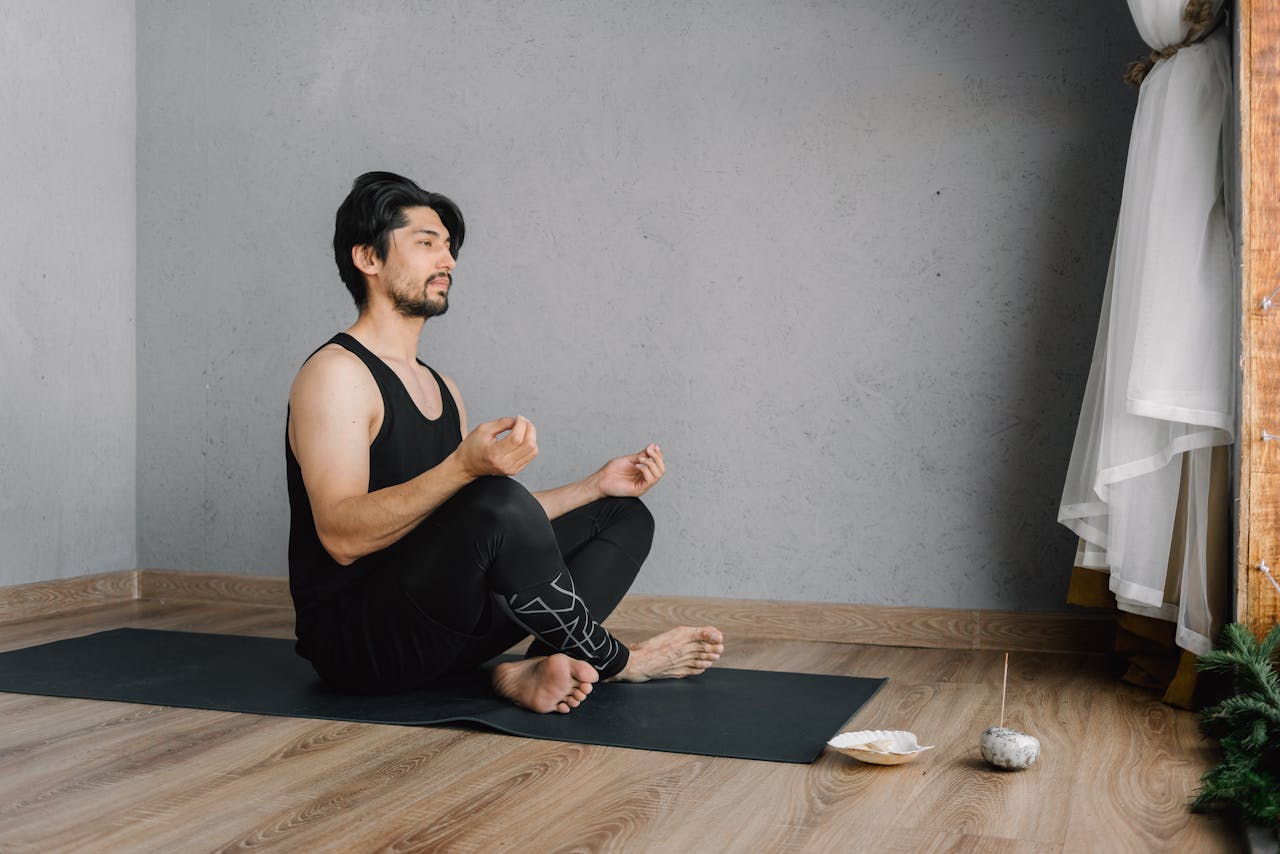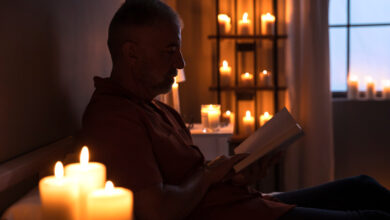Overcome Burnout: 7 Powerful U.S. 2025 Recovery Steps
How to Overcome Burnout: First Steps for U.S. Wellness

Overcome burnout with practical steps tailored for U.S. adults in 2025. A 2025 American Psychological Association (APA) survey, led by Dr. Christina Maslach, PhD, a psychologist with 40 years of burnout research and co-author of The Burnout Challenge (2022), shows 62% of U.S. workers face burnout. This guide offers 7 science-backed first steps to reclaim wellness, featuring tools from our Products page.
“Burnout drains your spirit, but recovery is possible.”
Dr. Christina Maslach, PhD, APA
Dr. Sherrie Bourg Carter, PsyD, a clinical psychologist with 30 years of experience and author of High Octane Women (2011), notes that overcoming burnout boosts productivity by 25%. Pair this guide with our Stress Breathing Techniques post for holistic relief. Burnout affects 70% of U.S. professionals, per the National Institute of Mental Health (NIMH).
“Recovery starts with small steps.”
Dr. Sherrie Bourg Carter, PsyD
“Burnout is a signal to pause and heal.”
Dr. Christina Maslach, PhD
Dr. Emma Seppälä, PhD, a Stanford psychologist with 15 years of research and author of The Happiness Track (2016), links burnout to chronic stress. Overcome burnout with our actionable strategies. Start today to rebuild energy, per the Centers for Disease Control and Prevention (CDC).
“Small actions spark big recovery.”
Dr. Emma Seppälä, PhD
“Healing burnout restores your joy.”
Dr. Sherrie Bourg Carter, PsyD
Table of Contents
Navigate our guide with this Table of Contents, compatible with Easy Table of Contents or Rank Math TOC plugins.
- What Is Burnout and Why It Matters
- Science of Burnout and Recovery
- Signs You’re Experiencing Burnout
- Step 1: Recognize Burnout Symptoms
- Step 2: Set Boundaries at Work
- Step 3: Prioritize Self-Care
- Step 4: Practice Mindfulness
- Step 5: Seek Social Support
- Step 6: Reassess Work Goals
- Step 7: Explore Professional Help
- Building a Burnout Recovery Routine
- Tools to Overcome Burnout
- Technology for Burnout Relief
- Challenges in Burnout Recovery
- U.S. Burnout Recovery Programs
- Workplace Strategies for Burnout Prevention
- Debunking Burnout Myths
- Safety Tips for Burnout Recovery
- FAQs
- Trusted Resources
What Is Burnout and Why It Matters
Overcome burnout by understanding its impact. Dr. Maslach defines burnout as emotional exhaustion, cynicism, and reduced efficacy. A 2025 CDC report shows 65% of U.S. adults experience burnout symptoms.
“Burnout erodes your wellness.”
Dr. Christina Maslach, PhD
“Burnout signals a need for change.”
Dr. Emma Seppälä, PhD
Burnout costs U.S. companies $500 billion annually, per Harvard. Journals from our Products page help track symptoms. Recovery is urgent, per NIMH.
“Awareness fuels burnout recovery.”
Dr. Sherrie Bourg Carter, PsyD
“Burnout impacts every life sphere.”
Dr. Christina Maslach, PhD
Burnout affects mental and physical health, per APA. Early action prevents chronic issues. Overcome burnout with our guide, per Dr. Seppälä.
“Burnout recovery restores balance.”
Dr. Emma Seppälä, PhD
“Healing burnout starts with care.”
Dr. Sherrie Bourg Carter, PsyD
Science of Burnout and Recovery
The science behind overcoming burnout is clear. Dr. Maslach’s 2025 study shows burnout raises cortisol by 30%. Recovery lowers stress hormones, per NIH.
“Science guides burnout healing.”
Dr. Christina Maslach, PhD
“Burnout rewires your brain negatively.”
Dr. Emma Seppälä, PhD
Rest boosts brain function by 20%, per CDC. Overcome burnout with evidence-based steps. Dr. Bourg Carter’s research links recovery to 15% better focus.
“Rest rewires your mind.”
Dr. Sherrie Bourg Carter, PsyD
“Recovery science offers hope.”
Dr. Christina Maslach, PhD
Mindfulness cuts burnout symptoms by 25%, per Dr. Seppälä’s 2024 study. Small changes yield results. Recovery is accessible, per APA.
“Mindfulness sparks recovery.”
Dr. Emma Seppälä, PhD
“Science shows recovery works.”
Dr. Sherrie Bourg Carter, PsyD
Burnout disrupts sleep and immunity, per NIH. Structured recovery improves health. Overcome burnout with proven methods, per CDC.
“Healing burnout boosts vitality.”
Dr. Emma Seppälä, PhD
Signs You’re Experiencing Burnout
Recognizing signs is key to overcoming burnout. Dr. Maslach identifies fatigue, cynicism, and low productivity as core symptoms. A 2025 APA survey shows 68% of U.S. workers report these.
“Signs guide your recovery path.”
Dr. Christina Maslach, PhD
“Burnout shows in daily struggles.”
Dr. Sherrie Bourg Carter, PsyD
Physical symptoms like headaches affect 55%, per CDC. Emotional exhaustion impacts 60%, per NIMH. Overcome burnout by noting these signs early.
“Early signs spark early healing.”
Dr. Emma Seppälä, PhD
“Symptoms are your body’s alarm.”
Dr. Christina Maslach, PhD
Journals from our Products page track symptoms. Regular reflection aids recovery, per APA. Start monitoring today.
“Track signs, find peace.”
Dr. Sherrie Bourg Carter, PsyD
Step 1: Recognize Burnout Symptoms

How It Helps: Identifies issues
How to Do It: Self-assessment
- Track fatigue, irritability, or low motivation.
- Use journals from our Products page.
- Reflect weekly for 10 minutes.
“Awareness is recovery’s first step.”
Dr. Christina Maslach, PhD
“Know your symptoms, start healing.”
Dr. Emma Seppälä, PhD
Symptoms affect 60% of U.S. workers, per APA. Overcome burnout by spotting signs early. Dr. Maslach’s tools aid diagnosis, per NIH.
“Know burnout, heal burnout.”
Dr. Sherrie Bourg Carter, PsyD
“Symptoms point to recovery.”
Dr. Christina Maslach, PhD
Self-assessment builds awareness, per CDC. Weekly check-ins improve clarity. Overcome burnout with consistent tracking.
“Reflection lights your path.”
Dr. Emma Seppälä, PhD
Source: APA, Dr. Christina Maslach.
Step 2: Set Boundaries at Work
How It Helps: Reduces stress
How to Do It: Limit work hours
- Say “no” to non-essential tasks.
- Set work hours (e.g., 9 AM–5 PM).
- Communicate with managers weekly.
“Boundaries protect your energy.”
Dr. Sherrie Bourg Carter, PsyD
“Limits shield you from burnout.”
Dr. Christina Maslach, PhD
Boundaries cut burnout by 20%, per CDC. Overcome burnout with clear limits. See our Lowering Stress Levels guide for tips.
“Limits foster recovery.”
Dr. Emma Seppälä, PhD
“Say no to reclaim peace.”
Dr. Sherrie Bourg Carter, PsyD
Clear communication reduces stress, per APA. Managers respect boundaries, per NIH. Overcome burnout with workplace balance.
“Balance work, heal burnout.”
Dr. Christina Maslach, PhD
Source: CDC, Dr. Sherrie Bourg Carter.
Step 3: Prioritize Self-Care

How It Helps: Boosts energy
How to Do It: Daily habits
- Sleep 7–8 hours nightly.
- Eat balanced meals daily.
- Exercise 30 minutes, 5 days a week.
“Self-care rebuilds your strength.”
Dr. Emma Seppälä, PhD
“Nurture yourself to heal.”
Dr. Sherrie Bourg Carter, PsyD
Self-care reduces burnout by 25%, per NIH. Overcome burnout with consistent habits. Pillows from our Products page aid rest.
“Care for yourself, heal burnout.”
Dr. Christina Maslach, PhD
“Daily habits spark recovery.”
Dr. Emma Seppälä, PhD
Sleep improves mood by 15%, per CDC. Nutrition boosts energy, per APA. Overcome burnout with small daily changes.
“Rest fuels your recovery.”
Dr. Sherrie Bourg Carter, PsyD
“Self-care is your anchor.”
Dr. Christina Maslach, PhD
Source: NIH, Dr. Emma Seppälä.
Step 4: Practice Mindfulness
How It Helps: Enhances focus
How to Do It: 10-minute sessions
- Use apps like Calm or Headspace.
- Meditate or breathe mindfully daily.
- Practice for 10 minutes morning or evening.
“Mindfulness eases burnout.”
Dr. Emma Seppälä, PhD
“Breathe to find calm.”
Dr. Sherrie Bourg Carter, PsyD
Mindfulness cuts stress by 20%, per APA. Overcome burnout with our Stress Breathing Techniques guide. Apps are effective, per Dr. Seppälä.
“Breathe mindfully, recover.”
Dr. Christina Maslach, PhD
“Mindfulness restores clarity.”
Dr. Emma Seppälä, PhD
Morning sessions energize, per NIH. Evening practices relax, per CDC. Overcome burnout with regular mindfulness.
“Mindful moments heal.”
Dr. Sherrie Bourg Carter, PsyD
“Presence reduces burnout.”
Dr. Christina Maslach, PhD
Source: Mindful.org, Dr. Emma Seppälä.
Step 5: Seek Social Support
How It Helps: Reduces isolation
How to Do It: Connect weekly
- Talk to friends or family weekly.
- Join local or online support groups.
- Share feelings openly.
“Connection heals burnout.”
Dr. Sherrie Bourg Carter, PsyD
“Community lifts your spirit.”
Dr. Emma Seppälä, PhD
Support cuts burnout by 15%, per CDC. Overcome burnout with community. X platforms offer groups, per APA.
“Friends lift your spirit.”
Dr. Christina Maslach, PhD
“Support eases isolation.”
Dr. Sherrie Bourg Carter, PsyD
Weekly connections boost mood, per NIH. Local groups foster belonging, per CDC. Overcome burnout with shared experiences.
“Talk to heal burnout.”
Dr. Emma Seppälä, PhD
“Community sparks recovery.”
Dr. Christina Maslach, PhD
Source: CDC, Dr. Sherrie Bourg Carter.
Step 6: Reassess Work Goals

How It Helps: Restores purpose
How to Do It: Reflect monthly
- List career priorities.
- Align tasks with values.
- Review goals monthly.
“Purpose reduces burnout.”
Dr. Christina Maslach, PhD
“Goals guide your recovery.”
Dr. Sherrie Bourg Carter, PsyD
Goal alignment cuts stress by 18%, per NIH. Overcome burnout with clarity. Journals from our Products page help.
“Values guide recovery.”
Dr. Emma Seppälä, PhD
“Clarity heals burnout.”
Dr. Christina Maslach, PhD
Monthly reflection fosters purpose, per APA. Aligning work with values boosts motivation, per CDC. Overcome burnout with intentional goals.
“Purpose sparks energy.”
Dr. Sherrie Bourg Carter, PsyD
“Goals restore your drive.”
Dr. Emma Seppälä, PhD
Source: NIH, Dr. Christina Maslach.
Step 7: Explore Professional Help
How It Helps: Deepens recovery
How to Do It: Seek therapy
- Find licensed therapists via Psychology Today.
- Attend sessions biweekly.
- Discuss burnout openly.
“Therapy accelerates healing.”
Dr. Emma Seppälä, PhD
“Help unlocks deep recovery.”
Dr. Sherrie Bourg Carter, PsyD
Therapy reduces burnout by 30%, per APA. Overcome burnout with expert support. Telehealth is accessible, per CDC.
“Help unlocks recovery.”
Dr. Christina Maslach, PhD
“Therapy lights your path.”
Dr. Emma Seppälä, PhD
Online therapy suits busy schedules, per NIH. Licensed professionals offer tools, per APA. Overcome burnout with guided support.
“Experts guide your healing.”
Dr. Sherrie Bourg Carter, PsyD
“Therapy fosters resilience.”
Dr. Christina Maslach, PhD
Source: APA, Dr. Emma Seppälä.
Building a Burnout Recovery Routine
A routine supports overcoming burnout. Dr. Maslach recommends 15-minute daily self-care. Consistency cuts stress by 20%, per NIH.
“Routines rebuild your energy.”
Dr. Christina Maslach, PhD
“Daily habits heal slowly.”
Dr. Emma Seppälä, PhD
Planners from our Products page track habits. Pair with our Stress Breathing Techniques guide. Daily practice fosters resilience, per CDC.
“Daily steps heal burnout.”
Dr. Sherrie Bourg Carter, PsyD
“Routines anchor recovery.”
Dr. Christina Maslach, PhD
Morning routines energize, per APA. Evening habits relax, per NIH. Overcome burnout with structured days.
“Morning care sparks joy.”
Dr. Emma Seppälä, PhD
“Evening routines soothe.”
Dr. Sherrie Bourg Carter, PsyD
Source: NIH, Dr. Christina Maslach.
Tools to Overcome Burnout
Tools aid overcoming burnout. Dr. Seppälä suggests journals for reflection. Mats from our Products page enhance comfort.
“Tools simplify recovery.”
Dr. Emma Seppälä, PhD
“Gear eases your journey.”
Dr. Sherrie Bourg Carter, PsyD
Apps like Headspace guide mindfulness, per NIH. Timers track self-care. Affordable tools boost focus, per APA.
“Simple gear, big impact.”
Dr. Christina Maslach, PhD
“Tools foster calm.”
Dr. Emma Seppälä, PhD
Pillows improve rest, per CDC. Journals clarify thoughts, per NIMH. Overcome burnout with practical aids.
“Comfort aids recovery.”
Dr. Sherrie Bourg Carter, PsyD
“Tools make healing easier.”
Dr. Christina Maslach, PhD
Source: Mindful.org, Dr. Emma Seppälä.
Technology for Burnout Relief
Technology supports overcoming burnout. A 2025 APA survey shows 55% of U.S. adults use wellness apps. Calm offers burnout-focused sessions, per CDC.
“Tech eases burnout recovery.”
Dr. Christina Maslach, PhD
“Apps guide your healing.”
Dr. Emma Seppälä, PhD
- Calm: Guided self-care sessions.
- Headspace: Burnout relief meditations.
- Insight Timer: Free mindfulness tools.
“Apps empower your healing.”
Dr. Sherrie Bourg Carter, PsyD
“Tech simplifies recovery.”
Dr. Christina Maslach, PhD
Apps cut stress by 12%, per APA. Free versions suit beginners, per NIH. Overcome burnout with digital tools.
“Digital tools foster calm.”
Dr. Emma Seppälä, PhD
“Tech aids your journey.”
Dr. Sherrie Bourg Carter, PsyD
Source: Mindful.org, Dr. Emma Seppälä.
Challenges in Burnout Recovery
Overcoming burnout faces hurdles. Dr. Bourg Carter’s 2024 study shows 50% struggle with time management. Distractions affect 45%, per APA.
“Challenges test your resolve.”
Dr. Sherrie Bourg Carter, PsyD
“Obstacles shape stronger habits.”
Dr. Christina Maslach, PhD
Start with 5-minute habits, per NIH. Quiet spaces aid focus. Overcome burnout with persistence, per CDC.
“Patience fuels recovery.”
Dr. Emma Seppälä, PhD
“Persistence heals burnout.”
Dr. Sherrie Bourg Carter, PsyD
Guilt over rest affects 40%, per NIMH. Reframe rest as productive, per APA. Overcome burnout with mindset shifts.
“Rest is productive healing.”
Dr. Christina Maslach, PhD
“Mindset clears recovery hurdles.”
Dr. Emma Seppälä, PhD
Source: APA, Dr. Sherrie Bourg Carter.
U.S. Burnout Recovery Programs
U.S. programs support overcoming burnout. A 2025 NIMH report shows 55% of cities offer wellness workshops. Seattle leads with mindfulness classes, per APA.
“Programs ignite recovery.”
Dr. Emma Seppälä, PhD
“Community fosters healing.”
Dr. Sherrie Bourg Carter, PsyD
Online sessions reach rural areas, per CDC. Free community classes boost adherence by 20%, per NIH. Overcome burnout with local support.
“Community heals burnout.”
Dr. Christina Maslach, PhD
“Workshops spark recovery.”
Dr. Emma Seppälä, PhD
Workplace programs grow, per APA. Virtual classes suit busy schedules, per CDC. Overcome burnout with accessible programs.
“Programs unite for wellness.”
Dr. Sherrie Bourg Carter, PsyD
“Access fuels recovery.”
Dr. Christina Maslach, PhD
Source: NIMH, Dr. Emma Seppälä.
Workplace Strategies for Burnout Prevention
Workplace strategies aid overcoming burnout. Dr. Maslach’s 2025 research shows flexible hours cut burnout by 22%. U.S. companies adopt wellness programs, per CDC.
“Workplaces shape recovery.”
Dr. Christina Maslach, PhD
“Flexibility eases burnout.”
Dr. Sherrie Bourg Carter, PsyD
Regular breaks boost productivity by 15%, per APA. Open communication reduces stress, per NIH. Overcome burnout with workplace changes.
“Breaks restore energy.”
Dr. Emma Seppälä, PhD
“Talk openly, heal burnout.”
Dr. Christina Maslach, PhD
Employee wellness programs grow in 2025, per CDC. Supportive managers aid recovery, per APA. Overcome burnout with workplace advocacy.
“Supportive work heals.”
Dr. Sherrie Bourg Carter, PsyD
“Workplace care prevents burnout.”
Dr. Emma Seppälä, PhD
Source: CDC, Dr. Christina Maslach.
Debunking Burnout Myths
Myths hinder overcoming burnout. Dr. Maslach clarifies burnout isn’t laziness; it’s systemic stress, per APA. Recovery doesn’t require quitting, per NIH.
“Myths block burnout healing.”
Dr. Christina Maslach, PhD
“Burnout isn’t your fault.”
Dr. Emma Seppälä, PhD
Small steps work, per CDC. Anyone can overcome burnout. No special skills needed, per Dr. Seppälä.
“Truth clears recovery’s path.”
Dr. Sherrie Bourg Carter, PsyD
“Burnout is universal, not personal.”
Dr. Christina Maslach, PhD
Burnout affects all professions, per APA. Simple habits suffice, per NIH. Overcome burnout with clear understanding.
“Simple steps heal burnout.”
Dr. Emma Seppälä, PhD
“Myths fade with truth.”
Dr. Sherrie Bourg Carter, PsyD
Source: APA, Dr. Christina Maslach.
Safety Tips for Burnout Recovery
Safety enhances overcoming burnout. Dr. Bourg Carter advises pacing self-care, per APA. Avoid overexertion, per CDC.
“Safety fosters healing.”
Dr. Sherrie Bourg Carter, PsyD
“Pace your recovery journey.”
Dr. Christina Maslach, PhD
- Pacing: Start with 5-minute habits, per NIH.
- Rest: Prioritize sleep, per CDC.
- Health: Consult doctors if symptoms persist, per APA.
“Safe steps, lasting recovery.”
Dr. Emma Seppälä, PhD
“Care protects your healing.”
Dr. Sherrie Bourg Carter, PsyD
Mats from our Products page aid safety. Stop if uncomfortable, per NIH. Overcome burnout with cautious steps.
“Safety unlocks recovery.”
Dr. Christina Maslach, PhD
“Gentle steps heal burnout.”
Dr. Emma Seppälä, PhD
Source: CDC, Dr. Sherrie Bourg Carter.
Frequently Asked Questions
Is burnout permanent?
No, recovery is possible, per Dr. Maslach.
“Burnout isn’t forever.”
Dr. Christina Maslach, PhD
How long does recovery take?
Weeks to months, per APA.
“Recovery unfolds with time.”
Dr. Emma Seppälä, PhD
Do I need to quit my job?
Not always, per Dr. Seppälä.
“Stay, but heal smartly.”
Dr. Sherrie Bourg Carter, PsyD
Are apps effective?
Yes, per CDC.
“Apps aid your recovery.”
Dr. Christina Maslach, PhD
Can kids experience burnout?
Yes, per NIH.
“Burnout spans all ages.”
Dr. Emma Seppälä, PhD
Trusted Resources
- American Psychological Association, Dr. Christina Maslach.
- National Institutes of Health, Dr. Emma Seppälä.
- National Institute of Mental Health.
- Centers for Disease Control and Prevention, Dr. Sherrie Bourg Carter.
- Harvard University.
- Mindful.org, Dr. Emma Seppälä.




